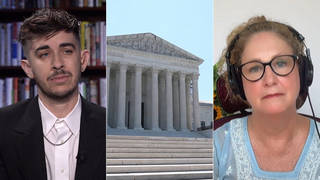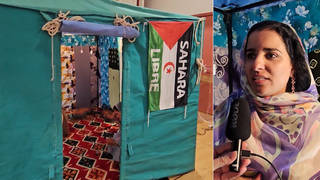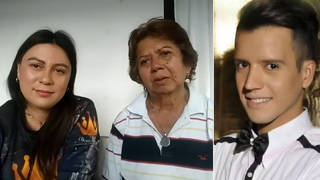
On Wednesday, the trailblazing attorney Michael Ratner died at the age of 72. In recent years, Ratner served as the chief attorney for WikiLeaks founder Julian Assange and became a leading critic of the U.S. crackdown on whistleblowers, including Chelsea Manning and Edward Snowden. We reached Assange in the Ecuadorean Embassy in London, where he sought asylum nearly four years ago.
More from this Interview
- Part 1: Remembering Michael Ratner, Pioneering Lawyer Who Fought for Justice from Attica to Guantánamo
- Part 2: Julian Assange: Michael Ratner was a “Campaigner for Justice” from Guatemala to Palestine
- Part 3: Suing Dictators Around the World: A Look at How Michael Ratner Helped Reshape Human Rights Law
- Part 4: Web Exclusive: Reed Brody & Michael Smith Remember Michael Ratner (Part 2)
Transcript
JUAN GONZÁLEZ: Today we are remembering the life and legacy of the trailblazing attorney Michael Ratner, who died on Wednesday at the age of 72. We’re joined by four guests who knew Michael well on a personal and professional level.
AMY GOODMAN: Reed Brody is counsel and spokesperson for Human Rights Watch. Michael Smith is an attorney and board member of the Center for Constitutional Rights. He co-authored a book with Michael called Who Killed Che?: How the CIA Got Away with Murder. We’re also joined in Pittsburgh by Jules Lobel. He is the president of the Center for Constitutional Rights and a law professor at the University of Pittsburgh.
And joining us from London is Julian Assange, founder of WikiLeaks, joining us from the Ecuadorean Embassy in London, where he has asylum. He has been there for almost four years. Julian Assange took refuge in the embassy in 2012. Assange wants to avoid extradition to Sweden over sex assault claims, which he has repeatedly denied. He says he fears Sweden will extradite him to the United States, where he could face trial for publishing classified information. He was represented during this time, through his years inside the embassy, by Michael Ratner.
Julian, welcome to Democracy Now! Your thoughts today on your late counsel, your late attorney and friend, Michael Ratner?
JULIAN ASSANGE: Michael touched many people throughout his life. And you’re seeing some of that today. He was my personal friend and adviser, our lead lawyer in the United States and in the English language. So, people here, people associated with WikiLeaks, its various staff, and our other lawyers in the United States are grieving.
But I want to reflect a little on Michael Ratner. Michael was important, not because of his—simply because of his talent and indefatigability, political and human consistency, but because he was a role model to so many who knew him, and a role model that is immutable. Michael was not a—one of these figures that plague the left so much. He was not a thundering genius, although he was brilliant. He was not someone who was ideologically hidebound. He was not someone who simply engaged in value projection or exhibitionism. Michael Ratner was a—led a life which was laudatory both at the—at his human level, in terms of his dealings with his family, his children, with his friends, and in terms of his work in law and political consistency. And he brought all these things together. And that is why you’re seeing the outpouring that you are seeing. Because people—because of Michael’s sensitivity across all of these domains, he is someone that you felt interacted with you as a human being, not simply someone who wanted something in a political direction or in terms of law. And while he had his flaws, these only made you understand that he really was a figure who you could strive to emulate. And I think this is probably—will be seen his most important legacy.
The other lawyers will talk about the cases that he was—the cases that he took. He certainly took many cases for us in relation to the ongoing, pending U.S. prosecution in the United States in relation to Chelsea Manning, in relation to banking blockades, in relation to all the politics surrounding this. He stepped forward first in relation to Guantánamo Bay, when other lawyers, such as groups associated with the ACLU, felt that this was not something that was politically achievable. But he is someone who inspires a model for people who are concerned about justice, that is achievable, not a model of self-destruction, not a model that is unable to achieve because it requires some particular kind of genius that cannot be worked towards. And that is something that deeply affected our young lawyers in the United States—for example—
JUAN GONZÁLEZ: Well, Julian—
JULIAN ASSANGE: [inaudible]—
JUAN GONZÁLEZ: Julian, I wanted specifically to ask you about this issue of the model that he provided to others. Could you talk a little bit about his impact both in terms of the work he did in defending whistleblowers like yourself, but also in terms of his ability to take the human rights issue to an international level and to deal across countries and mobilize legal battles across borders?
JULIAN ASSANGE: Yes. I mean, I’ve dealt with many lawyers in the United States and many people in the United States. And some of those, although they proclaim to be concerned with the abuse of state power in the United States, are in fact, themselves, very provincial and, in some ways, American exceptionalists of their own. Michael cut completely across that. He was genuinely concerned about people in Guatemala, about me, as an Australian, about people who face similar problems in Palestine, about people who have been extradited from the United Kingdom. And he was able to work with these other groups and other lawyers across jurisdictions, because they perceived that his genuine human concern for them was not simply about grabbing some prize that he could take back to the United States and exploit within his own, if you like, New York constituency.
And so, he was very effective as a lawyer and as a campaigner for justice, because he would do things—for example, seeing that people might be extradited to the United States, take up the battle at the place of extradition—for example, here in the United Kingdom, with one of my other lawyers, both on my case and in relation to some alleged terrorism cases, Gareth Peirce. Other lesser lawyers, lesser human beings, might have gone, “Well, I can get the glory, and I can get the credit, once that person is extradited to the United States, and then can be—the trial can be exploited, and great precedence can be set in the United States.” Michael was much more concerned, at a human level, to take action early in the process, and try and stop grand juries or try and stop extraditions, before the person entered in to a U.S. justice system that has become increasingly difficult to deal with.












Media Options